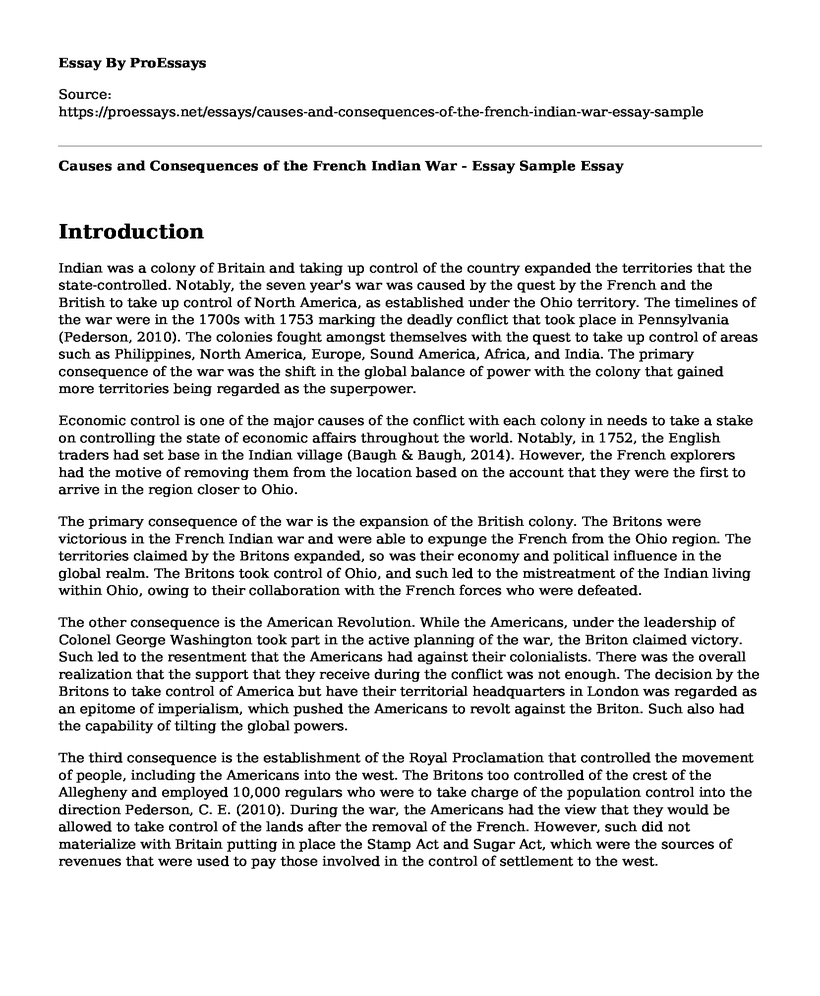Introduction
Indian was a colony of Britain and taking up control of the country expanded the territories that the state-controlled. Notably, the seven year's war was caused by the quest by the French and the British to take up control of North America, as established under the Ohio territory. The timelines of the war were in the 1700s with 1753 marking the deadly conflict that took place in Pennsylvania (Pederson, 2010). The colonies fought amongst themselves with the quest to take up control of areas such as Philippines, North America, Europe, Sound America, Africa, and India. The primary consequence of the war was the shift in the global balance of power with the colony that gained more territories being regarded as the superpower.
Economic control is one of the major causes of the conflict with each colony in needs to take a stake on controlling the state of economic affairs throughout the world. Notably, in 1752, the English traders had set base in the Indian village (Baugh & Baugh, 2014). However, the French explorers had the motive of removing them from the location based on the account that they were the first to arrive in the region closer to Ohio.
The primary consequence of the war is the expansion of the British colony. The Britons were victorious in the French Indian war and were able to expunge the French from the Ohio region. The territories claimed by the Britons expanded, so was their economy and political influence in the global realm. The Britons took control of Ohio, and such led to the mistreatment of the Indian living within Ohio, owing to their collaboration with the French forces who were defeated.
The other consequence is the American Revolution. While the Americans, under the leadership of Colonel George Washington took part in the active planning of the war, the Briton claimed victory. Such led to the resentment that the Americans had against their colonialists. There was the overall realization that the support that they receive during the conflict was not enough. The decision by the Britons to take control of America but have their territorial headquarters in London was regarded as an epitome of imperialism, which pushed the Americans to revolt against the Briton. Such also had the capability of tilting the global powers.
The third consequence is the establishment of the Royal Proclamation that controlled the movement of people, including the Americans into the west. The Britons too controlled of the crest of the Allegheny and employed 10,000 regulars who were to take charge of the population control into the direction Pederson, C. E. (2010). During the war, the Americans had the view that they would be allowed to take control of the lands after the removal of the French. However, such did not materialize with Britain putting in place the Stamp Act and Sugar Act, which were the sources of revenues that were used to pay those involved in the control of settlement to the west.
Conclusion
In conclusion, during the French Indian war, the Iroquois Confederacy was allies of the British forces. Such led them to receive better treatment from the Briton upon the completion of the war compared to the Indians who collaborated with the French. However, the Iroquois had continued to take up control of the Ohio valley but were incapacitated by their weak political and military power.
References
Baugh, D., & Baugh, D. A. (2014). The Global Seven Years War 1754-1763: Britain and France in a Great Power Contest. Routledge.
Pederson, C. E. (2010). French and Indian War. ABDO.
Cite this page
Causes and Consequences of the French Indian War - Essay Sample. (2022, Dec 08). Retrieved from https://proessays.net/essays/causes-and-consequences-of-the-french-indian-war-essay-sample
If you are the original author of this essay and no longer wish to have it published on the ProEssays website, please click below to request its removal:
- Research Paper on Can the Government Take Our Soda
- The Government Audit Standards Essay Example
- Bedford Literature of the American Slave History Before 1865 Essay Example
- Paper Example on 70s: Rapid Change in Society: A Look at 4 Articles
- US Drug Use: 24M Americans Use Illegal Drugs Every 30 Days - Research Paper
- Colonial Powers Clashed in America: France, England, Spain - Research Paper
- Pandemic Worsens Political Confusion: Effects on Governments - Essay Sample







